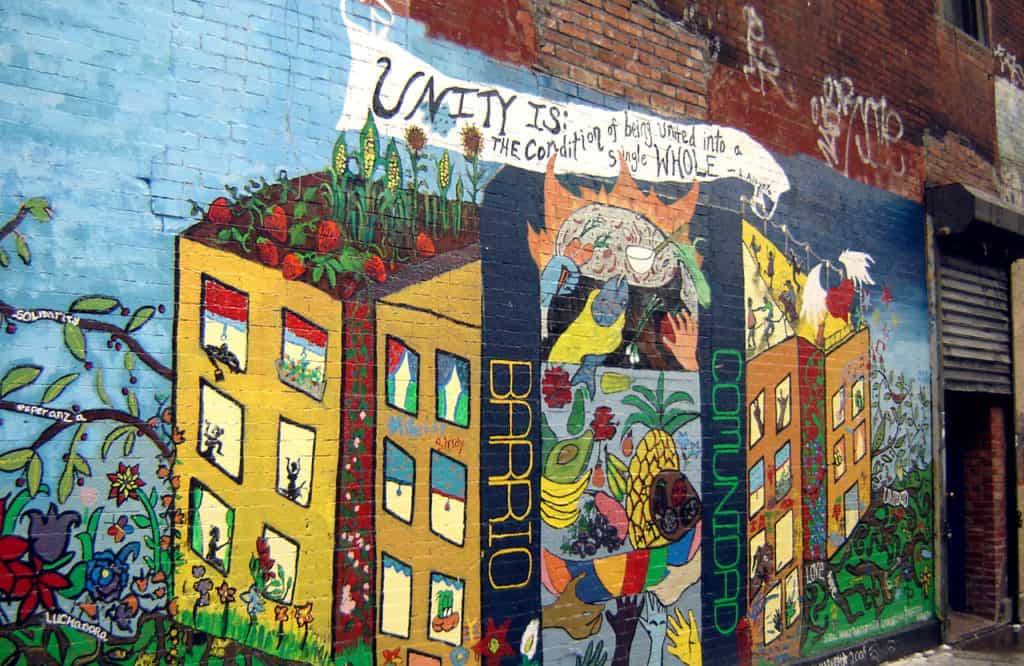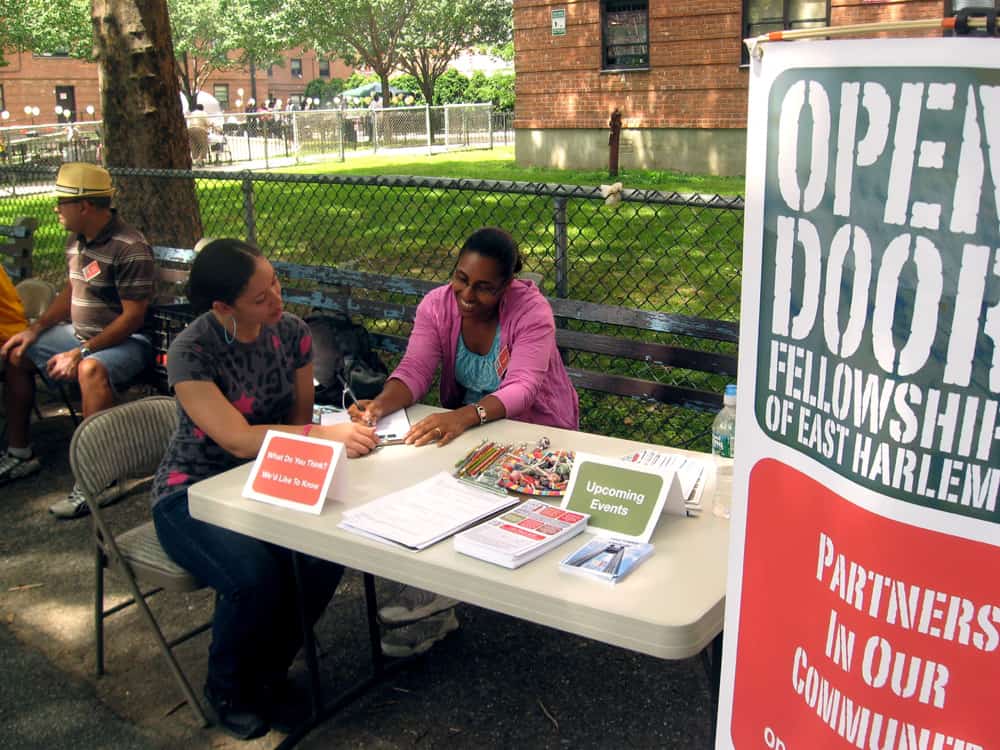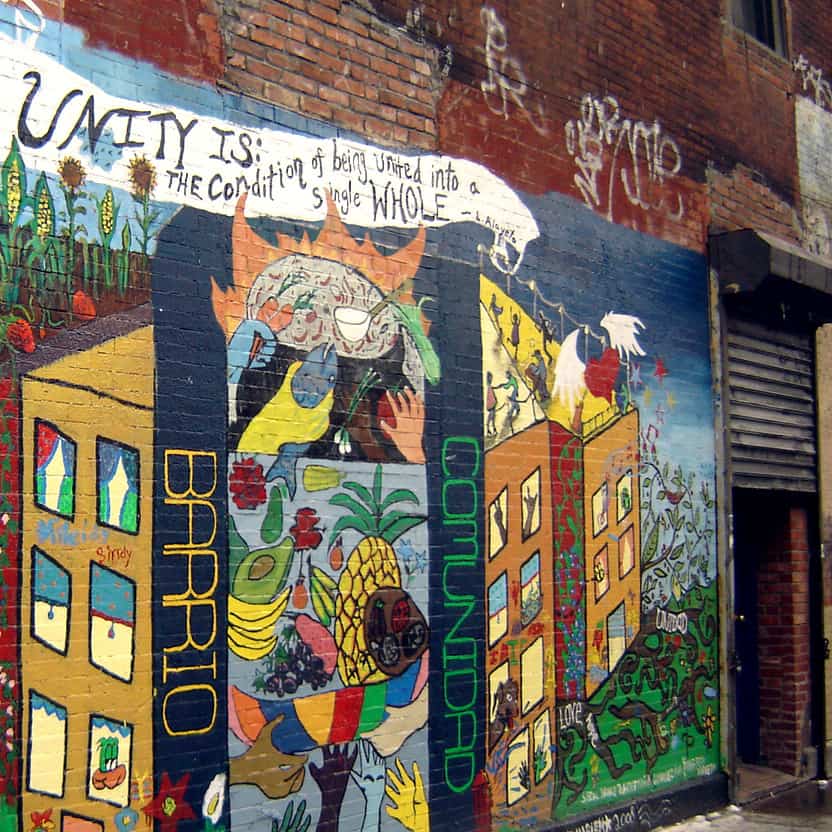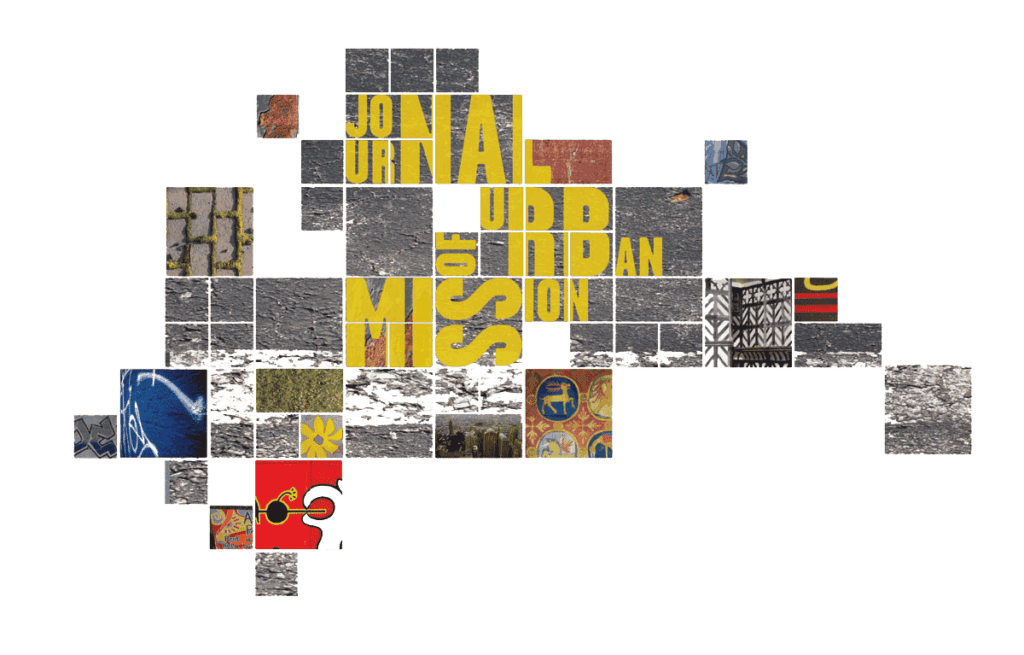Church-based community organizations often struggle with navigating partnerships in their communities, as they sit at the pluralistic community “table” in order to serve the poor and faithfully proclaim the gospel without compromising their Christian witness. What community issues can Christian organizations agree to work on with others in the community in order to bring honor to God’s kingdom? How exactly will they bear witness to the gospel so as not to be seen merely as one group among many committed to social transformation? This study offers some theological guidelines.
By Al Santino

As Executive Director of Northeast Community Transformation, a community development resource organization affiliated with the Christian Reformed Church denomination, one of my roles is to serve as a consultant to church-based community organizations that are serving needy neighborhoods in the Northeast United States. The consulting consists of a collaborative partnership between Northeast Community Transformation and the church or organization that serves the community. Training, consultations, access to resources and funding, and facilitation of community organizing are all provided to aid the efforts of our partners who are involved in youth development, life skills for adults, English as a Second Language, legal assistance, neighborhood improvement associations, parental support groups, and organizing citizens to address community issues. These efforts often involve collaboration with other churches and Christian organizations, community associations, and municipal institutions. The community development work these groups participate in is an act of ministry that seeks to bring God’s shalom to their communities, bringing glory to God.
God’s Shalom
Psalm 24:1 proclaims, “The earth is the LORD’s, and everything in it, the world, and all who live in it” (NIV). God’s creation is a reflection of his awesome majesty and holiness. The harmony and peace of God’s creation are described in the Old Testament as shalom. The dimensions of shalom include wholeness, well-being, justice, salvation, and prosperity.1 Shalom is therefore expressed as a harmonious relationship with God, community, and creation.
With the fall, God’s shalom was violently assaulted. Men and women fell out of fellowship with God, became adversarial with each other, and corrupted the Lord’s creation, using it for their own sordid gain. God, in his grace, ordained redemption. This redemption not only restores people to a right relationship with himself but also restores his created order toward its intended purpose. The Lord reinstated his original mandate (Gen 1:26-28) for humanity to be a steward of creation in Ps 8:6, which declares, “You made him ruler over the works of your hands; you put everything under his feet.” Willard Swartley comments on this calling of stewardship to restore shalom: “Shalom is indeed a gift but its maintenance in human life depends upon human response to God’s order that values and acts in accord with the divine moral order… These moral values include justice and righteousness.”2 Isaiah portrays this image: when the Holy Spirit is poured out, as it is in the New Testament, “the fruit of righteousness will be peace; the effect of righteousness will be quietness and confidence forever” (Isa 32:15, 17). Humanity is charged with restoring God’s shalom, which includes seeking justice and righteousness in the world.
A survey of the Scriptures also reveals that the blessings of God’s shalom are especially emphasized in his mercy toward the powerless and marginalized: the widow, the orphan, and the alien. The Lord says, “Do not deprive the alien or the fatherless of justice or take the cloak of the widow as a pledge. Remember that you were slaves in Egypt and the Lord your God redeemed you from there. This is why I command you to do this.” (Deut 24:17-18) Those freed from the oppression of sin should likewise fight against the sin of oppression. Christopher J. H. Wright summarizes:
[T]he ethical teaching of the Old Testament is first and foremost God-centered. It presupposes God’s initiative in grace and redemption; it is framed by what he has done and will do in history. It is shaped by his character and action; and it is motivated by personal experience of God’s dealings with his people.3
Mercy and justice are how God deals with his people; mercy is given to the widow, the alien, and the orphan who are deprived of God’s shalom, and justice is given to those who deprive others through the sin of oppression.
God’s shalom is personified in the incarnation of our Lord Jesus Christ. In humility, God entered into community with mankind. He broke bread at the community table with the poor, the sick, and the social outcasts (Luke 5:29-32). He pronounced forgiveness to the repentant and practiced mercy and justice toward the hungry, the widows, the orphans, and the despised “alien” Gentiles. Jerry Gill affirms:
To begin with, the Christian notion of incarnation is holistic and integrative. Jesus Christ came into the world as a whole, integrated person—not as a “pretend” person, à la Clark Kent. Moreover, he was involved in all of life, not just its so-called “sacred” aspects. In his relationships with other persons he took an active interest in the physical, social and emotional well-being of those whom he met.4
Christ brought God’s shalom—his wholeness, his well-being and his justice—to mankind, especially to those who were deprived of it.
The consummation of God’s kingdom will be a new heaven and a new earth (Rev 21-22), where community will dwell in shalom as the Lord intended. The poor will eat and be satisfied. The scales in the market places will no longer be unjust. Every race and ethnicity will be worshiping God in perfect peace around his throne. George Eldon Ladd comments, “The Kingdom has invaded the evil age to bring men in advance a partial but real experience of the blessings of the eschatological Kingdom…”5 God’s kingdom and its shalom were ushered in with Christ, but will only be experienced fully with the consummation of the new heaven and earth, but we are to be a part of bringing it now and bringing glory to God, as Christ did.
Community Development Seeks God’s Shalom

Working for shalom through community development is an act of ministry, because it brings about God’s shalom to our communities, thereby bringing God glory. The Father, through the Son, is at work glorifying himself in all things. Jesus is Lord of all: “For God was pleased to have all his fullness dwell in him, and through him to reconcile all things to himself, whether things on earth or things in heaven, by making peace through his blood, shed on the cross.” (Col 1:19-20) The present visible manifestations of his kingdom include mercy and justice and all the created order being redeemed in his name. These manifestations are God’s shalom seen here now; however, this is only a foretaste or shadow of things to come, as Ladd commented and as the author of Hebrews states, “In putting everything under him [Christ], God left nothing that is not subject to him. Yet at present we do not see everything subject to him.” (Heb 2:8b)
Because community is a characteristic part of God’s nature, and God has brought his kingdom now, caring for our communities and living in a community that experiences shalom is part of the church’s calling.
Community and relationship are endemic to the very nature of God.6 Father, Son, and Holy Spirit dwell in perfect shalom from eternity past to eternity future. These attributes of shalom are evident in the benediction of the Apostle Paul to the Corinthian church: “May the grace of the Lord Jesus Christ, and the love of God, and the fellowship of the Holy Spirit be with you all.” (2 Cor 13:14) God is glorified when people created in his image seek to dwell in community in his shalom. He hates indifference and oppression toward the poor and needy. His very nature is grace toward helpless, impoverished sinners. Because community is a characteristic part of God’s nature, and God has brought his kingdom now, caring for our communities and living in a community that experiences shalom is part of the church’s calling. Nicholas Wolterstorff affirms that “Shalom is both God’s cause in the world and our human calling.”7
The people of God, through the power and example of Christ, are called to have an “incarnational” presence at the community table. As the consummate community organizer, Christ brought his peace upon a people oppressed and fractured by Rome, by corrupt religious leaders, by poverty and sickness, and by their own sin and alienation from God. Since the church is God’s people, the called-out assembly, they are called to herald his kingdom and seek his shalom to glorify God. Jesus is the Light of the World, yet he has also entrusted his people to be “the light of the world” (Matt. 5:14-16). As a light, the church represents his kingdom in the words and deeds of the gospel, which include doing good unto all people, practicing mercy and justice toward the poor and oppressed, and seeking the shalom of our communities. The Lord has ordained this calling for the church to draw people to himself, “that they may see your good deeds and praise your Father in heaven.” (Matt. 5:16)
Wherever God’s people glorify him in word and deed, there is Christ in their midst, there is the church as the herald of the kingdom.8 This heralding characteristic of God’s people is foundational for a church-based organization to bring to the community table. The Reformation recovered the principle of the priesthood of all believers, as well as the holy calling of vocation, so the Christian public school teacher, police officer, or community organizer all have a ministry as important as any pastor or Sunday School teacher. In seeking to bring shalom to their communities, these community developers are a marvelous testimony to the grace and glory of God. Ronald S. Wallace cites Calvin, who speaks of “the possessions, wealth and natural abilities we have as privileged citizens for the benefit of the social community… No manner of life is more praiseworthy of God than that which yields some advantage to human society.”9 The people of God, called to seek God’s shalom for their communities, are to be involved at the community table, thus bringing glory to God through this act of ministry, which is community development.
Some will contend that the church is called to be holy and separate from the world; certainly the church must be guided by the principles of God’s kingdom and not a community agenda, but this does not preclude the church from engaging with the world as light, because it is God’s world, and his kingdom is not contained in the four walls of a building, an institutional framework, or an organizational structure.
Challenges arise, however, from outside the church and even from within it. In my East Harlem community, the church must wrestle with this outside difficulty: How can we show alienated young people hanging out “on the corner” that the gospel can bring new life to both them and their community? This picture of the church as a good neighbor concerned for the well-being of its community challenges some of these youths’ established definitions and practices, but is God not glorified when church members join a neighborhood association seeking to improve the quality of life in its community? Also in my community, the church is called to speak out and bring remedy to failing schools, police misconduct, or landlords refusing to repair rundown buildings. Some will contend that the church is called to be holy and separate from the world; certainly the church must be guided by the principles of God’s kingdom and not a community agenda, but this does not preclude the church from engaging with the world as light, because it is God’s world, and his kingdom is not contained in the four walls of a building, an institutional framework, or an organizational structure.
The common grace that God extends to non-Christians brings glory to God and gives Christians a practical way of interacting at the community table.
When city officials, who may not be Christian, uphold ordinances and practice justice in accordance with God’s righteousness and shalom, the Father is glorified, just as when God’s people are at the community “table” bearing witness to Christ as the source of all such justice and righteousness. The great Dutch theologian and statesman Abraham Kuyper comments, “And for our relation to the world: the recognition that in the whole world the curse is restrained by grace… and that we must, in every domain, discover the treasures and develop the potencies hidden by God in nature and in human life.”10 This restraining grace on the curse is what Kuyper and others have called common grace. Non-Christians practicing God’s righteousness is an example of this common grace. As the Apostle Paul articulates, “Yet he has not left himself without testimony: He has shown kindness by giving you rain from heaven and crops in their seasons; he provides you with plenty of food and fills your hearts with joy.” (Acts 14:17) The common grace that God extends to non-Christians brings glory to God and gives Christians a practical way of interacting at the community table.
Community development is an act of ministry, because God’s kingdom has come in Christ (Mark 1:15), and his shalom is a blessing and benefit of that kingdom. The people of God, his church, seek to incarnate God’s shalom bringing about the harmonious relationship with God, community, and creation, although difficulties will arise.
Community Developers as Ministers of God’s Shalom
Jesus sat at the community table with the social outcasts, healed the sick, and fed the hungry as visible demonstrations of his mercy and signs of his kingdom coming. His acts were both a testimony to the love and judgment of God. His deeds would either draw people to himself or serve as an indictment for their unbelief (John 10:25-26).
The minister is a steward of the gospel, which is proclaimed in word and deed, being a light in the world; thus, he or she is a minister of shalom. As was demonstrated earlier, Jesus sat at the community table with the social outcasts, healed the sick, and fed the hungry as visible demonstrations of his mercy and signs of his kingdom coming. His acts were both a testimony to the love and judgment of God. His deeds would either draw people to himself or serve as an indictment for their unbelief (John 10:25-26). Not everyone was open to God’s word in their life or community, but Jesus continued to proclaim the kingdom, as does the minister.
In the Old Testament, Nehemiah exemplifies the minister of shalom (Neh 5:1-13). He labored for both the spiritual and social restoration of his people. He exhorted his people toward holiness, which included building healthy community. He was a gifted community organizer. Nehemiah decried the sins of social injustice and defended the rights of the poor. He fostered responsible community by making sure that restitution and reconciliation were practiced. John M. Perkins, founder of the Christian Community Development Association, comments on the legacy of Nehemiah:
My fondest dream for my country is that God would raise up an army of Nehemiahs who would relocate to every community of need throughout the land, live out the gospel that gives hope to the hopeless, restore the moral fibers to our broken communities, and bring liberty and justice.11
As a community development consultant, I have been entrusted with this ministry of shalom, which Dr. Perkins describes. I have the privilege of teaching God’s precepts and exhorting our ministry partners to play an active role in restoring their communities. I instruct and coach them in the practical application of understanding their communities and exercising their gifts toward being shalom builders. For example, I am currently assisting in the oversight of the Americorps community service internship at Germantown Hope Community Church in Philadelphia. The church is seeking to help organize its neighbors around issues such as neighborhood safety and community beautification. Its Americorps intern works to bring neighbors together to address these issues and be a catalyst for the neighbors to form town watches, to hold events that feature planting flower pots and block cleanup, or to reclaim empty lots for community gardens. Another example is my work with my own church in East Harlem, New York. Open Door Fellowship has forged a partnership with a neighborhood association to develop an after-school program and to address tensions in community-police relations. My role is to help facilitate this partnership between the church and this neighborhood association. In this way, I help everyone at the community table to see that every perfect gift is from above, whether it be classified as a spiritual gift or a gift of common grace. For some this will mean tutoring young people, for others it will mean counseling single mothers or becoming a community advocate. God’s gifts are useful for bringing shalom no matter what they are.
Reconciliation is needed to bring healing and shalom even among Christians. As an organizer, I have a ministry of reconciliation that is important in bringing together diverse viewpoints. I invite Christians from various churches, denominations, races and ethnicities, and social classes to a Christian “table,” where, by God’s grace, a consensus and collaboration may develop to address community needs. Here the conversation is complex and difficult. What can we agree upon? Where can we disagree and still work together? How can we honor the Lord? When we work together in community to answer these questions and to help our communities, the Lord often takes out the “double-edged sword” and does his work. He uses his people’s gifts to do kingdom work, but through this dialog he also exposes and challenges their hidden pride, prejudice, self reliance, and contempt for brethren who “don’t quite see it like me.” The same dynamic occurs at the community table. The Lord uses his people to bring about real community transformation to his glory, but he also challenges them deeply through the other members of the community.
The community’s sense of what is right and just may not always correlate with God’s kingdom. Christians and church-based organizations may have to walk away from the community table. Such is the apparent paradox of exercising our dual citizenship in both the Kingdom of God and the kingdoms of this world.
But it is also true that as a minister, I am charged with proclaiming the whole counsel of God and bearing witness to Christ. The community’s sense of what is right and just may not always correlate with God’s kingdom. Christians and church-based organizations may have to walk away from the community table. Such is the apparent paradox of exercising our dual citizenship in both the Kingdom of God and the kingdoms of this world. Bruce Winter articulates this challenge in this quotation from the second century Epistle to Diognetus:
They [Christians] reside in their respective countries but only as aliens. They take part in everything as citizens and put up with everything as foreigners. Every foreign land is their home and every home is a foreign land. They find themselves in the flesh but do not live according to the flesh.12
Stewards of God’s shalom must live with this paradox of serving God’s kingdom in the world’s kingdom.
An even more challenging endeavor is bringing together Christians and non-Christians, including those from other religions, to address community issues. Again, I use the example of my church, Open Door Fellowship in East Harlem, New York. Here, various secular and religious points of view sit at the same table and seek to find a common ground. Everyone’s concerns have to do with how to empower young people with education, how to instill in them moral values, and how to provide them with opportunities for social growth and achievement. There is a common consensus at the table despite the various points of view—we all desire in them a respect for authority, upstanding language and behavior, and a sense of responsibility and discipline. We have within us a common grace because of our common humanity.
A common objection is: How can a Christian talk about values without invoking the authority of Scripture? Does this not negate the whole enterprise of the community table? Not necessarily. What I have found is that our partnership with our neighbors often invokes deeper conversations. They often ask, “Why do you do what you do? How can you speak to our young people about these values with authority? What is the basis for your convictions?” And now the Christian has opportunity to bear witness to the kingdom. As a result of these interactions, several un-churched people from the neighborhood association in East Harlem have been attending Open Door Fellowship church services.
As a minister I have the responsibility to proclaim and participate in the mandate God has given His church to care for our communities. He has also given the church a mandate to bear witness to his common grace, which can lead people toward his redeeming grace in Christ (Rom 2:4). Gregory Pierce expounds on this challenge of collaborating at the community table in what some have called “value-based community organizing”:
We believe that God rules in the created order and in redemptive history, that God’s intention is one of justice and equity. We believe that poor and middle class families have valid and complimentary self interests and that alliances can be made on the basis of shared concerns and shared ideology… But we do claim vigorously the right to introduce our values into public dialogue.13
The ministry of shalom is entrusted to God’s people: his ministers, his community developers, his organizers, and his reconcilers. The gospel must be proclaimed in word and deed, so these stewards of God’s shalom must bear witness to the gospel as they work with other Christians and non-Christians at the community table to bring about community transformation that reflects God’s justice and righteousness.
Conclusion
Ultimately, only the Lord can bring shalom. In a fallen world at war with him, shalom is not always visible—at least not to our eyes. However, the Lord is always doing the work of shalom, in us, in his church and, yes, even in the world. This refining work is done according to his perfect counsel and will, until his kingdom comes.
Community development is an act of ministry, because God in Christ is reconciling all things to himself and is glorifying his name in all the earth. It is act of ministry because the church has been called by God to be in his world as a good neighbor bearing witness to his kingdom as it works for the common good. It is an act of ministry because the minister is called to proclaim God’s shalom: reconciliation, mercy, and justice. The Lord has inscribed this calling in his people: “He has showed you, O man, what is good. And what does the Lord require of you? To act justly and to love mercy and to walk humbly with your God.” (Mic 6:8)
Notes
1 Willard M. Swartley, “The Relation of Justice/Righteousness to Shalom/Eirene,” Ex Auditu 22 (2006): 29-53.
2 Ibid., 29-30.
3 Christopher J. H. Wright, An Eye for an Eye: The Place of Old Testament Ethics Today (Downers Grove: InterVarsity Press, 1983), 31.
4 Jerry H. Gill, “Faith in Learning: Integrative Education and Incarnational Theology,” Christian Century, 17 October 1979, 1009.
5 George Eldon Ladd, The Presence of the Future (Grand Rapids: Eerdmans, 1974), 292.
6 Bryant L. Myers, Walking With the Poor: Principles and Practices of Transformational Development (New York: Orbis Books, 1999), 26.
7 Nicholas Wolterstorff, Until Justice and Peace Embrace (Grand Rapids: Eerdmans, 1983), 72.
8 George Eldon Ladd, A Theology of The New Testament (Grand Rapids: Eerdmans, 1974), 111.
9 Ronald S. Wallace, Calvin, Geneva and the Reformation (Grand Rapids: Baker, 1988), 127.
10 Abraham Kuyper, Lectures on Calvinism (Grand Rapids: Eerdmans, 1931), 31.
11 John M. Perkins, ed., Restoring At Risk Communities (Grand Rapids: Baker, 1995), 71.
12 Bruce W. Winter, Seeking the Welfare of the City: Christians as Benefactors and Citizens (Grand Rapids: Eerdmans, 1994), 12.
13 Gregory F. Pierce, Activism That Makes Sense (Ramsey: Paulist Press, 1984), 104.


